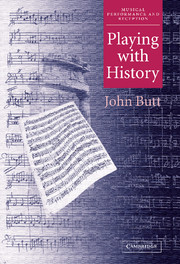Book contents
- Frontmatter
- Contents
- Preface
- Acknowledgements
- List of abbreviations
- PART 1 HISTORICALLY INFORMED PERFORMANCE IN MUSIC CRITICISM
- PART 2 HISTORICALLY INFORMED PERFORMANCE AND THE IMPLICATIONS FOR WORK, COMPOSER AND NOTATION
- 2 Historical performance and ‘truth to the work’: history and the subversion of Platonism
- 3 Historical performance and ‘truth to the composer’: rehabilitating intention
- 4 Negotiating between work, composer and performer: rewriting the story of notational progress
- PART 3 HISTORICALLY INFORMED PERFORMANCE WITHIN THE CULTURE OF THE LATE TWENTIETH CENTURY
- Notes
- Bibliography
- Index
2 - Historical performance and ‘truth to the work’: history and the subversion of Platonism
Published online by Cambridge University Press: 02 December 2009
- Frontmatter
- Contents
- Preface
- Acknowledgements
- List of abbreviations
- PART 1 HISTORICALLY INFORMED PERFORMANCE IN MUSIC CRITICISM
- PART 2 HISTORICALLY INFORMED PERFORMANCE AND THE IMPLICATIONS FOR WORK, COMPOSER AND NOTATION
- 2 Historical performance and ‘truth to the work’: history and the subversion of Platonism
- 3 Historical performance and ‘truth to the composer’: rehabilitating intention
- 4 Negotiating between work, composer and performer: rewriting the story of notational progress
- PART 3 HISTORICALLY INFORMED PERFORMANCE WITHIN THE CULTURE OF THE LATE TWENTIETH CENTURY
- Notes
- Bibliography
- Index
Summary
I have often heard it stated by scholars and others interested in performance on early instruments that they would rather hear a great artist on the wrong instrument than a mediocre player on the right one. I am no longer willing to accept that statement. Perhaps it is wrong to put the instrument before the artist, but I have begun to feel that it must be done … There is simply no way that the greatest, most sensitive artist can ever come close to a true Mozartean sense with [modern instruments].
Malcolm Bilson, 1980Many involved with performance on historical instruments may now find Bilson's remarks extreme; the rhetoric of historicist performance has become progressively milder since the early 1980s. Yet something of Bilson's sense is probably still harboured by any of us who choose the old instruments over modern ones; why, after all, make this choice if one does not believe that there is some positive advantage? Bilson's famous remark may thus still represent a reductio, however much ad absurdum, of the historicist enterprise. Moreover, the same type of thinking is evident in reconstructionist approaches to other arts, such as the Globe Theatre project.
- Type
- Chapter
- Information
- Playing with HistoryThe Historical Approach to Musical Performance, pp. 53 - 73Publisher: Cambridge University PressPrint publication year: 2002



